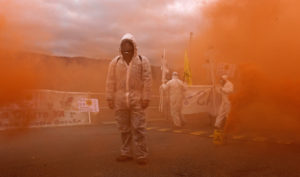As I write this, in my favourite local café in Rome, the temperature outside is close to 40°C. So yes, it’s hot. Yet, thanks to a relatively old invention — air conditioning — I’m able to work in comfort. The 10-minute bike ride back home will be tougher than usual, but it won’t kill me. Like most people here, I consider these temperatures to be a nuisance — but that’s about it.
According to the news, however, I should be terribly concerned — terrified, in fact. Everyone’s running headline stories about the “extreme”, “record-breaking” and “deadly” hot weather sweeping across Asia, the US and, most notably, Europe. Here, the heatwave was unofficially named Cerberus, the multi-headed dog that guards the gates of Hades, before being replaced by Charon, the man who ferries the dead there. Rome is being called the “infernal city”. To be honest, I can think of several much more hellish places around the world at the moment — cities plagued by poverty, terrorism and war. And yet we are told that the current heat waves are a taste of the “hell” that awaits us as a result of climate change.
Such sensationalism is revealing of the climate hysteria that has gripped the West — and the way in which it is seriously hindering our ability to devise rational solutions. Many seem convinced that if we don’t drastically reduce CO2 emissions (or eliminate them altogether) by our unmoveable deadline of 2030, climate change will extinguish humanity, if not all life on Earth. We’re told this is because “the science tells us”. This is bonkers.
Yes, climate change and global warming are real — and yes, they are largely a result of human activity — but the planet is not about to be “uninhabitable”. The science is, in fact, much more nuanced: according to the UN’s Intergovernmental Panel on Climate Change (IPCC), it is far from clear whether the world is actually experiencing more drought, flooding or hurricanes, nor the extent to which any changes are influenced by human behaviour.
Scientists aren’t even sure what the impact on agriculture will be: one 2011 study done for the UN’s Food and Agriculture Organization predicts that by mid-century climate change might reduce global crop output by less than 1% of today’s output. As the UN climate panel put it: “For most economic sectors, the impact of climate change will be small relative to the impacts of other drivers [such as] changes in population, age, income, technology, relative prices, lifestyle, regulation, governance, and many other aspects of socioeconomic development.”
While the overall impact of climate change on humanity will be negative, nowhere does the science tell us that life on Earth will perish if we don’t go Net Zero by 2030. These deadlines are conjured by politicians, not scientists. As a result, the apocalyptic narrative currently dominating the climate debate is completely unfounded — and unethical. In The Rhetoric of Reaction, Albert Hirschman warned about the “futility thesis” — how people will reject preventive action due to a fatalistic belief that it is simply too late to make a difference. Today, this phenomenon can be seen in the thousands of young Westerners who are suffering from “climate anxiety” and choosing not to have children. According to the UN’s latest Human Development Report, the world is more pessimistic than at any point between now and before the First World War — even though in almost every measurable way, life on Earth is better than ever.
Not only is this rhetoric of impending doom hindering the possibility of fixing the problem, it is also engendering all manner of authoritarian fantasies. It has become an article of faith that the best response is to drastically cut back CO2 emissions — and that this should be done whatever the cost. For if the world is about to end, anything is justified. The increasingly violent forms of “eco-activism” are also part of this trend. Fear, depression, desperation and authoritarianism are mutually reinforcing.
Yet any realistic climate policy will take decades to pay off; even if we significantly reduce our emissions in the following years, the total amount of carbon dioxide in the air will still increase, though at a slightly diminished rate. This is especially true for Western countries, which will account for a smaller and smaller share of global emissions in the coming years and decades. Even if rich countries completely curtail all emissions (an impossible scenario), the temperature increase, after 80 years, will only be 0.4°C smaller than it would have been otherwise, according to estimates by Bjorn Lomborg based on a model used by the UN’s panel of climate scientists. So even if Western countries were able to meet their unrealistic climate objectives, we will continue to experience the negative consequences of climate change — floods, storms and heat waves — for a very long time.
This doesn’t mean that we shouldn’t do anything to try to stop temperatures from rising above a certain limit. But if our aim is to actually save lives — and surely we have a greater moral obligation to those who are alive today than to future generations — then our priority should be adaptation: that is, measures that will help people cope with the effects of climate change, and which would save lives here and now.
Adaptation has already greatly reduced climate-related deaths, even in the face of rising temperatures: it’s why deaths from storm surges have been declining even as sea levels have risen; and why the most likely future scenario is that fewer people will die from climate-related flooding — just as heat-related deaths have been declining in certain countries. Adaptation is also why deaths and devastation due to wildfires have dropped dramatically; and why, overall, climate-related fatalities have declined by about 96% over the past century, despite a massive increase in the global population. This is testament to the strong relationship between economic development and climate resilience.
In the context of the current heatwaves, this means that, instead of “climate action”, people should be demanding subsidies for air conditioners and lower energy prices from their governments — straightforward measures that would drastically lower the number of heat-related deaths, not empty promises that won’t make a difference in the short term (and will have a negligible impact in the long term). But this is what happens when nightmares and elitist fantasies replace the actual material conditions of people as the basis for politics — “saving the planet” becomes more important than saving actual human beings.
In this way, climate hysteria is completely distorting our perception of the world. Last week, a report by the World Meteorological Organization that the beginning of July was the world’s hottest week on record received widespread attention. At around the same time, another report was published — this time by the UN Development Programme — that was greeted with less interest. But it was arguably more important. It estimated that the Covid-19 pandemic and subsequent surge in inflation and borrowing costs had pushed an extra 165 million people into poverty, bringing the total global figure to 1.65 billion, over 20% of the world’s population.
Climate activists often argue that those living in poor countries are the ones who will suffer the most from climate change. This is true. But, once again, it is illogical to claim that our priority, and theirs, should therefore be to reduce global emissions as fast as possible. Poor people’s priority is not be poor. A UN global poll of nearly 10 million people found climate to be the lowest policy priority among the poor, far behind education, health, and nutrition.
Of course, these objectives can’t always be treated in isolation. There are often trade-offs: reducing or eliminating world poverty requires more growth, which inevitably entails more energy and therefore more emissions. Indeed, coping with the effects of climate change is itself energy-intensive, as the climate paradox of air conditioning makes clear. Faced with this realisation, environmentalists continue to entertain the notion that the future energy needs of developing countries can be met entirely by renewables — yet this is also a fantasy.
As a report published last year by the Breakthrough Institute makes clear, even though renewables (ideally in combination with nuclear energy, which is fully carbon-free) have a role to play in the development of Africa and other poor regions, many of the world’s poorer countries have no choice but to rely on fossil fuels in the coming years: coal, oil and natural gas. “Continued and increasing fossil-fuel consumption is regrettable, but it will mean more people will be fed with less land, reducing deforestation, and enabling the transition to modern agriculture,” write the report’s two co-authors, Vijaya Ramachandran of the Breakthrough Institute and Arthur Baker of the Development Innovation Lab at the University of Chicago. Remember, poverty is the leading cause of death in developing countries; more growth in these countries will mean more emissions but significantly fewer deaths. Moreover, helping the world’s poorest grow out of poverty will also make them more resilient in the face of climate change.
One might think that, even for those with environmentalist sympathies, the choice here isn’t too difficult to make: fewer deaths is surely a goal worth pursuing. Instead, development banks and international funding groups such as the World Bank and the European Investment Bank are increasingly linking finance to climate adaptation and mitigation, curtailing or halting their funding of fossil-fuel or nuclear projects. Here we can observe the best example of the way in which climate hysteria is pushing us to make increasingly irrational — and ultimately very dangerous, if not deadly — choices for poor and marginalised people everywhere, in the developing world as well as in rich countries.
This doesn’t mean that we shouldn’t do anything about climate change; it means that we need to strike the right balance between improving human welfare — which implies more emissions in the short term — and mitigating temperature rises. As long as poverty continues to kill more people than climate change, environmentalists who profess to care about saving the world should think about who they are saving it for.
Disclaimer
Some of the posts we share are controversial and we do not necessarily agree with them in the whole extend. Sometimes we agree with the content or part of it but we do not agree with the narration or language. Nevertheless we find them somehow interesting, valuable and/or informative or we share them, because we strongly believe in freedom of speech, free press and journalism. We strongly encourage you to have a critical approach to all the content, do your own research and analysis to build your own opinion.
We would be glad to have your feedback.
Source: UnHerd Read the original article here: https://unherd.com/



